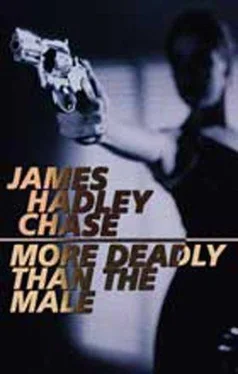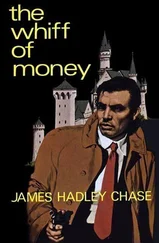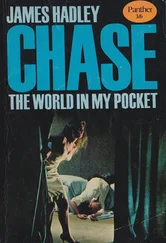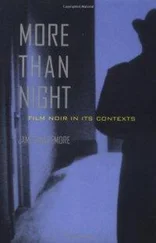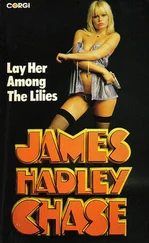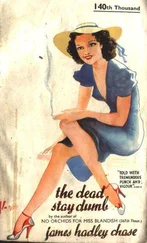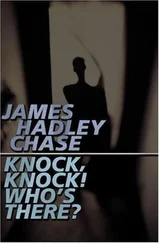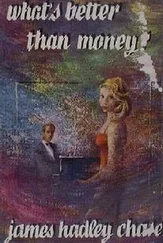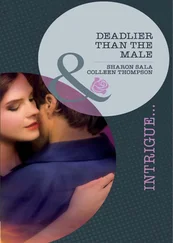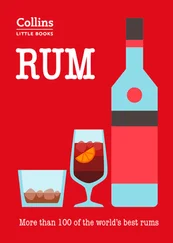Somehow he got the cab moving, and turned the corner. He was now in such a fever that he clamped down on the accelerator, yet the cab moved slowly, making a terrific din. He clung to the wheel, his eyes bolting out of his head, terrified, wild. Then, as no one shouted after him, he gained control of his nerves and managed to change into second and then into top.
The cab went on. Ahead was Oxford Street. George swung blindly into the busy thoroughfare. He nearly collided with a bus, and he realized with alarm that he had crossed against the red traffic light. The bus driver shouted at him, but he accelerated and left the bus behind.
He was coming to Oxford Circus now. The lights changed to red when he was a few yards away, and he pulled up so sharply that he stalled the engine.
He sat in a heap, sweat running down his face, his ears pricked. He felt he was experiencing some horrible nightmare.
He became aware that cars behind him were blaring with their horns and klaxons. Without his noticing it, the traffic light had changed to green. Hurriedly he started the engine, forgetting he was still in gear. The taxi jumped forward and went hounding down the street like a startled frog.
People were staring at him from the pavement. Another taxi overtook him, and the driver leaned out: “Make it waltz, mate,” he pleaded as he passed. “You’ve done everything else.”
Gritting his teeth, George changed down. He turned right and drove on, past the BBC, up Portland Place and into Regent’s Park.
There was scarcely any traffic in the Park, and he became calmer. He must get used to this cab, he thought, before he ventured again into the wilderness of traffic lights and heavy traffic. He drove round the inner circle several times, stopping and starting, changing up and down, until he had regained some of his confidence. Then he stopped and lit a cigarette and tried to make a plan. He decided that he would go down Park Lane, along Piccadilly to Berkeley Square, up the square to Bruton Street, into New Bond Street and down into Piccadilly again. It was getting late, and his best chance was to catch some girl coming from a nightclub.
He would have to be quick, because the theft of the cab would be reported very soon and the police would be looking for it. He had, at the best, a half an hour in which to find the girl and get her out of the West End.
He started the cab again and headed for Park Lane. A number of people hailed him, as he drove along, hugging the kerb, but after a quick glance in their direction and seeing that they were all in parties, he kept on.
Without stopping, he drove along the route he had planned. His nerves began to ease as he went on. There seemed to be no unescorted girls waiting for a taxi, and he began to hope that the plan would fizzle out.
But as he drove down New Bond Street for a second time, he saw a girl standing on the kerb, and she waved to him.
One look was enough. She was about Cora’s build, and she was wearing a dark coat and skirt; a smart little hat was perched on her head, and as she waved at George a gold bangle glittered in the street light.
George pulled up, eyeing the girl, his mouth suddenly dry, his nerves tingling. The girl was a typical Mayfair deb—the kind of girl whose picture appeared regularly in the Bystander and Tatler, and who seemed to spend their lives either smiling vacantly at some sleek young man in tails and white tie at Lady Someone or other’s ball, or resting their hard little sterns on shooting- sticks while attending a shoot in Scotland.
“Chunks!” she shouted excitedly. “I’ve got one. Chunks, do come on!”
Oh, hell! George thought in a fever, she’s not alone! He wanted to engage gear and drive away, but the girl had already jerked open the cab door, and was standing looking over her shoulder at the open door of a building, partly obscured by the darkness.
“Do come on, Chunks,” she called again. She turned to George. “He won’t be a minute. I want to go to Highgate Village.”
At this moment a tall young man came running down the steps. “You are marvellous, Babs,” he said. “I don’t know how you do it. You’re just too nauseatingly efficient. Why couldn’t you let the porter find you a taxi?”
“I like doing things for myself,” the girl said.
“Are you sure you don’t want me to come?” the young man asked. “I don’t mind. I don’t mind a hit.”
George stiffened. He looked quickly at the girl, willing her to refuse.
“Of course, I don’t,” she returned. “Besides, you always get a hit hectic in taxis, Chunks, and it’s too hot to wrestle with you all the way to Highgate.”
The young man giggled. “All right, darling,” he said. “Have it your own way. I’ll see you tomorrow.”
“Thanks for a terrific evening,” she returned, climbing into the taxi.
The young man slammed the door.
“Manor House, Parkway,” he said to George. “Do you know it?”
George nodded, keeping his face in the shadow. He was shivering with excitement, and he let his clutch in with a jerk and roared away towards Hyde Park Corner. What a bit of luck! he thought. She’s just right. I’m sure she’s just right. Now, what’s the next step? Highgate Village lay beyond Hampstead Heath. That was a good spot to do what he had to do. At this hour it would be unlikely that anyone would be about. He gripped the steering wheel tightly. He had perfect faith and confidence in his gun. He felt positive that all he had to do was to point the gun at this girl and she would obey him There was nothing the Luger couldn’t get for him—and for Cora.
He turned up Park Lane and slid to a standstill as the traffic lights changed. As he sat waiting, he noticed a policeman at the corner, watching him, and his heart lurched. Were they looking for him already? The light turned to amber, and he hurriedly drove on.
He heard the girl singing to herself. She seemed a pretty lively type, he thought. Rich, and spoilt, without a care in the world. What a different world Cora lived in! He went on up Orchard Street, past Baker Street station and on towards Swiss Cottage.
It wouldn’t be long now. A distant clock chimed the quarter past midnight. He’d have to look slippy. Any moment now the police might be looking for him. He sent the cab whizzing up Fitzjohn’s Avenue, and in a few moments he was on the Heath.
A bright moon hung in the sky, lighting the trees and the scrub, throwing heavy black shadows. The place seemed completely deserted. He kept on until he saw a large clump of trees standing by the roadside, then he reached forward and cut the ignition. The engine died with a splutter and the cab coasted towards the trees, finally coming to a standstill in the deepest shadows. George sat for a moment, screwing up his nerve, then he climbed down stiffly onto the road.
The girl poked her head out of the window.
“Why are you stopping?” she asked. “Is there anything wrong?” She seemed quite calm and mildly interested.
George pulled his hat farther down over his eyes.
“Petrol,” he grunted. “I’m sorry, miss; I thought I’d filled up.”
“What a bore!” she exclaimed, opening the cab door. “Now, I suppose I’ll have to walk. Well, it’s not so far. What are you going to do?” George was startled that she should think of him. It was not what he expected from the upper classes.
“I’ll manage,” he said, his hand on the cold butt of the gun.
“If you like to walk along with me,” she said, “I’ll give you a tin of petrol. You’ve got miles to go hack.”
He wished feverishly that she hadn’t been like this. He wished she had flown into a temper and had upbraided him. It would have been so much easier. Now she was making him feel like a rat. His mind flew to Cora. He had to go through with it. He couldn’t return to the flat empty handed. He eyed the girl’s clothes furtively. They were expensive and well cut. He was sure they would fit Cora. He could imagine her face when she saw them: that thought decided him.
Читать дальше
